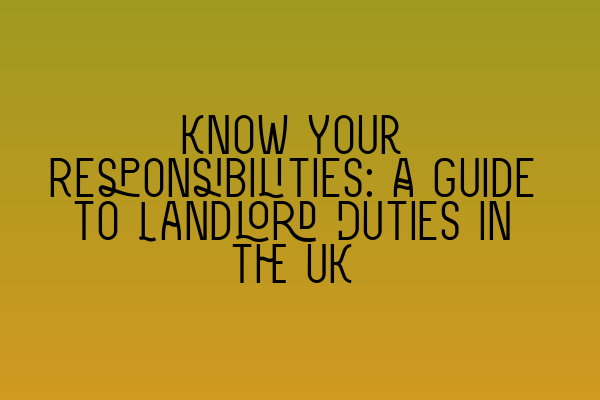Know Your Responsibilities: A Guide to Landlord Duties in the UK
Being a landlord in the UK comes with a set of legal obligations and responsibilities. It is crucial for landlords to have a thorough understanding of these duties to ensure compliance with property laws and to maintain a positive landlord-tenant relationship. In this comprehensive guide, we will discuss the key responsibilities that landlords must adhere to in the UK.
1. Provide a Safe and Habitable Property
One of the primary duties of a landlord is to provide tenants with a safe and habitable property. This includes ensuring that the property meets all necessary health and safety standards. Landlords must maintain the structure of the property, including the roof, walls, and floors, and ensure that essential facilities such as heating, water, and electricity are in good working order.
Furthermore, landlords are responsible for conducting regular inspections to identify and address any potential hazards or repairs needed. This includes maintaining the property’s compliance with fire safety regulations, gas safety standards, and electrical safety requirements.
Updates in UK Property Laws: Key Changes and Implications
2. Protect Tenant Deposits
Landlords in the UK are legally required to protect tenant deposits in a government-approved tenancy deposit scheme. This scheme ensures that tenants’ deposits are held securely and can be returned to them at the end of the tenancy, provided no damages or unpaid rent exists.
Landlords must provide tenants with prescribed information regarding the deposit protection within 30 days of receiving the deposit. Failing to protect the deposit or provide the necessary information can result in severe penalties.
3. Provide Proper Documentation
When entering into a tenancy agreement, landlords must provide tenants with a written document that outlines the terms and conditions of the tenancy. This document, typically known as an Assured Shorthold Tenancy agreement, clearly sets out the rights and responsibilities of both parties, including the rent amount, payment terms, and notice periods.
Additionally, landlords must also provide tenants with an Energy Performance Certificate (EPC) and a Gas Safety Certificate, ensuring that tenants are aware of the property’s energy efficiency and that gas appliances and installations have been inspected and deemed safe.
Legal challenges in property transactions: A comprehensive guide
4. Deal with Repairs and Maintenance
Landlords have a legal obligation to maintain the property in a good state of repair. This means promptly addressing any repairs that arise during the tenancy, such as plumbing issues, electrical faults, or structural damages. Regular property inspections can help identify these repairs and ensure they are dealt with in a timely manner.
It is important to note that tenants have the right to live in a property that is in good repair and suitable for habitation. Failure to address essential repairs can lead to legal consequences, such as rent reductions or even claims for compensation.
Dominate Property Law Questions: Avoiding Common Pitfalls
5. Respect Tenant Privacy and Rights
While landlords have the right to access the property for repairs and inspections, it is essential to respect tenants’ privacy and adhere to their rights. Landlords must provide at least 24 hours’ written notice before entering the property, except in emergency situations.
Furthermore, landlords must not unlawfully evict or harass tenants. Tenants have legal protection against eviction, and landlords must follow proper legal procedures, such as obtaining a court order, if eviction becomes necessary.
6. Handle Tenancy Deposits Fairly
At the end of the tenancy, landlords must handle the return of the tenant’s deposit fairly and transparently. Deductions from the deposit should only be made for legitimate reasons, such as unpaid rent or damages beyond normal wear and tear. Landlords must provide tenants with an itemized list of deductions, along with any remaining balance, within a specific timeframe.
If there is a dispute over the deposit, landlords and tenants should attempt to resolve the matter amicably. However, if an agreement cannot be reached, both parties can seek assistance from a tenancy deposit scheme’s dispute resolution service.
7. Stay Up-to-Date with Property Laws and Regulations
Property laws and regulations in the UK are subject to change. It is crucial for landlords to stay informed about any updates or amendments that may affect their responsibilities. Regularly reviewing resources such as the government’s official website and seeking professional legal advice can help landlords maintain compliance with their duties.
Land Law Revision Tips: Ace Your Exam Preparation
Mortgages and Land Law: Essential Considerations for Property Transactions
Conclusion
Being aware of and fulfilling your responsibilities as a landlord in the UK is not only a legal obligation but also crucial for maintaining a positive landlord-tenant relationship. By providing a safe and habitable property, protecting tenant deposits, maintaining proper documentation, dealing with repairs, respecting tenant privacy, handling tenancy deposits fairly, and staying up-to-date with property laws and regulations, landlords can ensure their compliance and create a harmonious living environment for their tenants.
